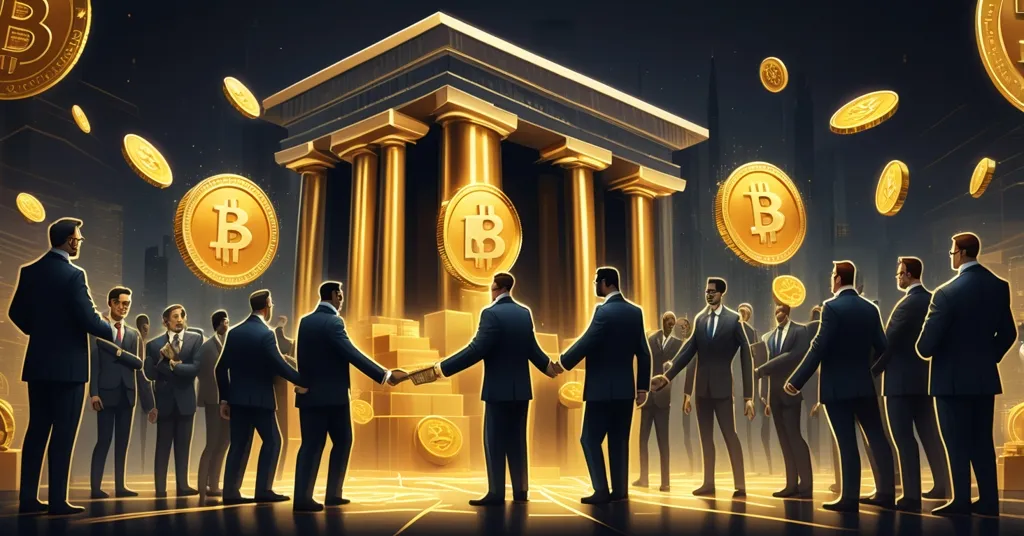CZ Pardoned by Trump: Binance Ties to World Liberty Financial Spark Pay-to-Play Rumors

CZ Pardon by Trump: Did Binance’s Ties to World Liberty Financial Buy Freedom?
Changpeng “CZ” Zhao, the mastermind behind Binance, the world’s largest cryptocurrency exchange, is back in the spotlight after receiving a presidential pardon from Donald Trump in late October 2025. This bombshell decision has unleashed a torrent of speculation, with many questioning whether this act of clemency is a genuine reset for CZ or a dirty deal tied to Binance’s involvement with a Trump family-linked crypto venture. The stakes are sky-high as the worlds of digital assets and political power collide in a way that could reshape perceptions of blockchain technology.
- Pardon Ignites Debate: Trump’s clemency for CZ fuels rampant rumors of political favors linked to Binance’s role in World Liberty Financial, a Trump-connected crypto project.
- Legal Rebuttal: CZ’s attorney slams allegations of a “pay-to-play” scheme as utterly baseless.
- Wider Fallout: Lawmakers push for probes, while the crypto community grapples with the implications for blockchain’s integrity.
CZ’s Legal Saga: From Conviction to Clemency
For those just tuning in, CZ’s journey through the legal gauntlet began in 2023 when he pleaded guilty to charges tied to Binance’s failure to enforce robust anti-money laundering (AML) and know-your-customer (KYC) protocols. Binance, a titan in the crypto space where millions trade Bitcoin, Ethereum, and a slew of altcoins daily, had been a magnet for regulatory heat due to its past lapses. These failures allegedly enabled illicit transactions, including potential money laundering and sanctions evasion, painting a target on the exchange’s back. The consequences were brutal: CZ served a four-month prison sentence, and Binance coughed up a jaw-dropping $4.3 billion in fines to settle with US regulators. Since then, the platform has scrambled to tighten its compliance under a microscope of global oversight. Now, in 2025, Trump’s pardon has nullified CZ’s criminal record—but it’s opened a Pandora’s box of suspicion about the motivations behind it.
The Trump Family Crypto Play: Unpacking World Liberty Financial
What’s stoking the flames of controversy is Binance’s reported entanglement with World Liberty Financial, a crypto venture bearing ties to the Trump family. Launched earlier in 2025, this project pitches itself as a decentralized finance (DeFi) platform, with its crown jewel being USD1, a stablecoin pegged to the US dollar. For the unversed, stablecoins are cryptocurrencies designed to hold a steady value, unlike the rollercoaster rides of Bitcoin or Ethereum. Think of USD1 as a digital dollar bill—ideal for transactions or as a safe haven in the volatile crypto markets. Binance is said to have provided key engineering muscle for USD1’s rollout, a collaboration that’s raised more than a few eyebrows given the political connections at play.
The plot gets murkier with reports of a major investor funneling a staggering $2 billion into World Liberty Financial, with some payments allegedly made in USD1 tokens. That’s not pocket change, even in the high-stakes crypto arena— it’s the kind of money that could bankroll entire blockchain ecosystems. Critics are quick to suggest this could be a veiled payment for political leverage, especially since the pardon came hot on the heels of the project’s debut. While hard evidence remains elusive, the optics couldn’t be worse, and questions about whether CZ paid for a Trump pardon continue to swirl. Is this the rebellious disruption we root for in crypto, or just a shiny new wrapper on age-old cronyism?
Legal Defense: CZ’s Camp Rejects Foul Play
CZ’s attorney, Teresa Goody Guillén, has come out guns blazing to quash the mounting accusations. During a recent segment on the Pomp Podcast, she trashed the pay-to-play narrative, describing it as a “pile up of a lot of false statements” with no substance to back it up. She also took issue with labeling World Liberty Financial as simply “the Trump family’s company,” implying a more intricate ownership web that’s yet to be fully unraveled. Binance’s top brass have backed her up, asserting that any investments linked to the project were orchestrated by an independent investor group, not as a bargaining chip for political mercy. Their message is loud and clear: this is pure speculation, not fact.
“Pile up of a lot of false statements.” – Teresa Goody Guillén on the Pomp Podcast, dismissing pay-to-play allegations.
Political Uproar: Lawmakers Demand Answers
Despite the firm denials, a shadow of skepticism looms large. US lawmakers, particularly from influential bodies like the Senate Finance Committee and House Financial Services Committee, are clamoring for investigations into possible conflicts of interest. Presidential pardons have always been a lightning rod for controversy—look no further than historical cases like Bill Clinton’s eleventh-hour clemencies or Trump’s own pardons of political allies in his first term. Toss in the wild west of cryptocurrency, and the drama intensifies. Blockchain, the decentralized tech powering Bitcoin and other digital currencies, is built on ideals of transparency and liberation from centralized grip. Yet, when ventures like World Liberty Financial get mired in political quicksand, those ideals start looking like a cruel illusion.
For those unfamiliar, a presidential pardon in the US is a constitutional power that allows the president to forgive federal offenses, effectively wiping the slate clean for the recipient. Historically, they’ve often sparked outrage when perceived as favors for friends or donors, and CZ’s case fits right into that contentious legacy with a modern crypto twist.
A Different Angle: Mercy or Strategic Move?
Not everyone is ready to jump on the conspiracy bandwagon. Some posit that the pardon might not be the sinister plot it’s made out to be. CZ’s conviction was specific to compliance oversights at Binance, not personal fraud or malevolent schemes. He did his time, and the exchange has since poured resources into regulatory alignment. Could this pardon be a straightforward act of mercy, or perhaps a deliberate signal of support for the crypto sector’s role in global finance? Trump has previously tipped his hat to digital assets, notably in a 2024 address where he hailed blockchain as “a cornerstone of American innovation.” Aligning with a heavyweight like CZ could be less about shady deals and more about staking a claim in the future of money. Still, when the optics are this muddy, even the purest intentions struggle to shine through.
Crypto Community Split: Purists vs. Pragmatists
Within the crypto sphere, reactions are as polarized as a bull-bear market debate. Bitcoin maximalists, who see BTC as the sole bastion of true decentralization, are rolling their eyes at stablecoins like USD1, calling them centralized crutches that betray crypto’s core mission of financial sovereignty. One vocal figure on X snarked, “Stablecoins are just fiat with blockchain glitter—now they’re political bargaining chips too.” On the other hand, altcoin enthusiasts and DeFi proponents argue that stablecoins are vital for mainstream adoption, offering stability for everyday use and bridging the gap between traditional finance and blockchain. They view projects like World Liberty Financial as messy but necessary experiments. This clash of ideals highlights a fundamental tension: as crypto scales, can it cling to its anarchist roots, or will it inevitably bend to the powers that be?
The Larger Stakes: Crypto’s Dance with Power
Stepping back, it’s clear that crypto isn’t just a geeky side hustle anymore—it’s a multi-trillion-dollar force mingling with the elite corridors of influence. When a behemoth like Binance, with its checkered regulatory past, gets linked to a politically charged outfit like World Liberty Financial, it’s a glaring wake-up call about the gaps in transparency and accountability. The long-term risks are stark: if the public starts seeing blockchain as a playground for insider games, trust could crumble faster than a scam token’s chart. Yet, in the vein of effective accelerationism, there’s a silver lining—such scandals could jolt the industry and regulators into action, speeding up the push for clear rules and rooting out bad actors. Disruption thrives on chaos, but only if we harness it right.
Key Questions Surrounding CZ’s Pardon
- What drove Trump to pardon CZ in 2025?
The exact reasoning remains unclear, but fingers point to Binance’s technical backing of World Liberty Financial and a $2 billion investment linked to the Trump family venture, stirring theories of political quid pro quo. - Is there solid proof of a pay-to-play arrangement?
CZ’s legal team and Binance staunchly refute any such deal, labeling claims as unfounded, though lawmakers aren’t buying it and are demanding deeper scrutiny into USD1 transactions and investment timelines. - Why does Binance’s role in World Liberty Financial matter?
Their involvement in developing USD1 and the enormous financial backing tied to the project suggest potential business incentives behind political moves, intensifying calls for transparency. - What does this mean for cryptocurrency regulation?
It exposes the pressing need for robust frameworks as digital assets intertwine with political spheres, risking public confidence if blockchain is viewed as a tool for elite manipulation. - Can crypto uphold its decentralized values amid such controversies?
The verdict is pending—while these incidents reveal vulnerabilities, they could also catalyze reforms if the community holds both industry leaders and political figures to account.
Let’s not sugarcoat it: this mess is a crucible for the crypto world. We stand for decentralization, privacy, and smashing the status quo, but that doesn’t mean giving a free pass to potential power abuses. Whether you bleed Bitcoin or dabble in DeFi, the implications here hit hard. If blockchain is to revolutionize finance, it can’t afford to be branded as just another lever for backdoor dealings. CZ’s pardon might be on the up-and-up, or it could be a symptom of systemic rot—either way, the hunger for truth is unrelenting. In a domain as fierce and transformative as crypto, tough questions aren’t a burden; they’re our lifeblood. We either clean our own mess or lose the fight for credibility before it’s truly begun.



